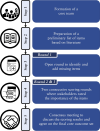A Core Outcome Set for Inflammatory Bowel Diseases: Development and Recommendations for Implementation in Clinical Practice Through an International Multi-stakeholder Consensus Process
- PMID: 38019894
- PMCID: PMC11812258
- DOI: 10.1093/ecco-jcc/jjad195
A Core Outcome Set for Inflammatory Bowel Diseases: Development and Recommendations for Implementation in Clinical Practice Through an International Multi-stakeholder Consensus Process
Abstract
Background and aims: Standardising health outcome measurements supports delivery of care and enables data-driven learning systems and secondary data use for research. As part of the Health Outcomes Observatory [H2O] initiative, and building on existing knowledge, a core outcome set [COS] for inflammatory bowel diseases [IBD] was defined through an international modified Delphi method.
Methods: Stakeholders rated 90 variables on a 9-point importance scale twice, allowing score modification based on feedback displayed per stakeholder group. Two consecutive consensus meetings were held to discuss results and formulate recommendations for measurement in clinical practice. Variables scoring 7 or higher by ≥80% of the participants, or based on consensus meeting agreement, were included in the final set.
Results: In total, 136 stakeholders (45 IBD patients [advocates], 74 health care professionals/researchers, 13 industry representatives, and four regulators) from 20 different countries participated. The final set includes 18 case-mix variables, three biomarkers [haemoglobin to detect anaemia, C-reactive protein and faecal calprotectin to detect inflammation] for completeness, and 28 outcomes (including 16 patient-reported outcomes [PROs] and one patient-reported experience). The PRO-2 and IBD-Control questionnaires were recommended to collect disease-specific PROs at every contact with an IBD practitioner, and the Subjective Health Experience model questionnaire, PROMIS Global Health and Self-Efficacy short form, to collect generic PROs annually.
Conclusions: A COS for IBD, including a recommendation for use in clinical practice, was defined. Implementation of this set will start in Vienna, Berlin, Barcelona, Leuven, and Rotterdam, empowering patients to better manage their care. Additional centres will follow worldwide.
Keywords: Quality of life; socioeconomical and psychological end points.
© The Author(s) 2023. Published by Oxford University Press on behalf of European Crohn’s and Colitis Organisation.
Conflict of interest statement
NC and IC are employees and shareholders of F. Hoffmann-La Roche. GN received lecture fees/consultant fees/advisory board member fees from AbbVie, Merck Sharp & Dohme, Takeda, Janssen-Cilag, Pfizer, Gilead, Galapagos, Ferring, Vifor, AstroPharma, Falk, Bristol Myers Squibb, Arena Pharmaceuticals, and Amgen. CJvdW has served on advisory boards for Abbvie, Takeda, Pfizer, Galapagos, and Celltrion; she is supported by research funding from ZonMW, Tramedico, Falk Benelux, and Pfizer. BS served as a consultant for AbbVie, Boehringer Ingelheim, Bristol Myers Squibb, Celgene, Galapagos, Gilead, Janssen, Lilly, Pfizer, PredictImmune, and Takeda; and received speaker’s fees from AbbVie, BMS, CED Service GmbH, Falk, Galapagos, Ferring, Janssen, Pfizer, and Takeda [served as representative of the Charité]. FC received research support from AbbVie, Ferring, MSD, Shire, Takeda, and Zambon; speaker fees from AbbVie, Chiesi, Ferring, Gebro, MSD, Shire, Takeda, and Zambon. NB received research support from AbbVie, Janssen, Takeda, Adacyte, Actial; speaker’s fees from AbbVie, Adacyte, Janssen-Cilag, MSD, Pfizer, and Takeda; and consultancy fees from Janssen-Cilag and Abbvie. ES has received speaker’s fees from Biogen, Takeda, BMS, AbbVie, and Janssen; and consultancy fees from Janssen. CH received speaker’s fees from Takeda, Ferring, AbbVie, and Janssen; and consultancy fees from Pfizer; she has acted as local principal investigator for clinical trials for Janssen and GlaxoSmithKline; she is PI on projects at the Karolinska Institutet partly funded by investigator-initiated grants from Takeda and Tillotts. TS reports grants and personal fees from AbbVie, Roche, Sanofi, Takeda, and Novartis. MJ has served as a consultant for Ferring and Takeda Pharma; and received speaker’s fee from MSD, Ferring, and Takeda Pharma; she is the PI on projects at Aarhus University Hospital partly funded by investigator-initiated grants from Takeda Pharma. GF served as a consultant for AbbVie, Takeda, Janssen, Pfizer, Galapagos, Sandoz, Amgen, and Ferring. EG received consultant fees/advisory board member fees from AbbVie, Boehringer Ingelheim RCV, Celgene, Coloplast, Dr. Falk, Eli Lilly, Ferring, Galapagos Biopharma, Gilead, Janssen-Cilag, Merck, Merck Sharp & Dohme, Pfizer, Stada, and Takeda. MF reports research support from AbbVie, Amgen, Biogen, EG, Janssen, Pfizer, Takeda, and Viatris; speaker’s fees from AbbVie, Amgen, Biogen, Boehringer Ingelheim, Falk, Ferring, Janssen-Cilag, Lamepro, MSD, Pfizer, Sandoz, Takeda, Truvion health care and Viatris; and consultancy fees from AbbVie, AgomAb Therapeutics, Boehringer Ingelheim, Celgene, Celltrion, Eli Lilly, Janssen-Cilag, Medtronic, MSD, Pfizer, Regeneron, Samsung Bioepis, Sandoz, Takeda, and Thermo Fisher. None of these activities have any relation to the present study.
Figures



Comment in
-
Measurement Is Necessary But Not Sufficient to Improve Quality of Care for Patients With Inflammatory Bowel Disease.J Crohns Colitis. 2024 Oct 15;18(10):1529-1530. doi: 10.1093/ecco-jcc/jjae119. J Crohns Colitis. 2024. PMID: 39178333 No abstract available.
References
-
- Ng SC, Shi HY, Hamidi N, et al.. Worldwide incidence and prevalence of inflammatory bowel disease in the 21st century: a systematic review of population-based studies. Lancet 2017;390:2769–78. - PubMed
-
- Torres J, Bonovas S, Doherty G, et al.. ECCO guidelines on therapeutics in Crohn’s disease: Medical treatment. J Crohns Colitis 2020;14:4–22. - PubMed
-
- Raine T, Bonovas S, Burisch J, et al.. ECCO guidelines on therapeutics in ulcerative colitis: surgical treatment. J Crohns Colitis 2022;16:2–17. - PubMed
-
- Burisch J, Jess T, Martinato M, et al.. The burden of inflammatory bowel disease in Europe. J Crohns Colitis 2013;7:322–37. - PubMed
-
- Huppertz-Hauss G, Lie Høivik M, Jelsness-Jørgensen L-P, et al.. Health-related quality of life in patients with inflammatory bowel disease 20 years after diagnosis. Inflamm Bowel Dis 2016;22:1679–87. - PubMed
Publication types
MeSH terms
Substances
Grants and funding
LinkOut - more resources
Full Text Sources
Research Materials
Miscellaneous

